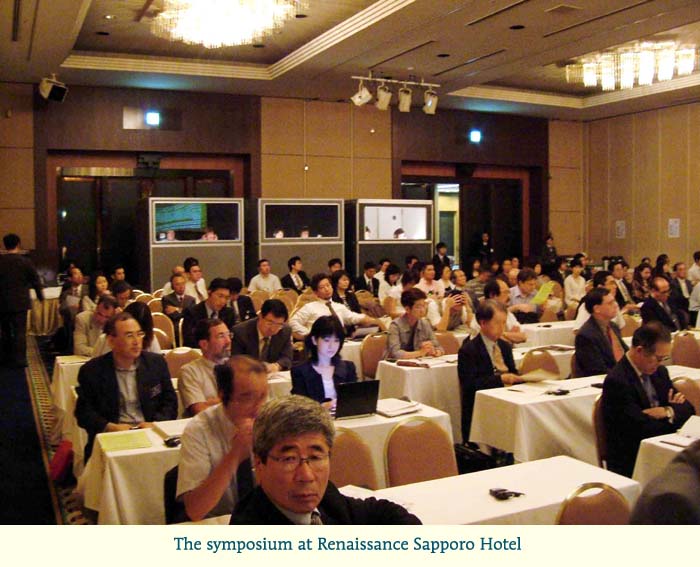| Annual Newsletter of the Slavic Research Center,
Hokkaido University |
||
| No.12
, December 2004 |
back to INDEX>> | |
Essays
| INOUE Koichi |
Victor Shnirelman |
Paul Werth |

The annual Summer Symposium of the SRC was held at the Renaissance Sapporo Hotel from July 14 to 16. This year's theme was "Siberia and the Russian Far East in the 21st Century: Partners in the 'Community of Asia'." The Symposium was mainly funded by a special scientific research fund granted by the Japanese Ministry of Education's 21st Century "Center of Excellence" Eprogram ("Making a discipline of Slavic Eurasian Studies" 2003–2008) and partly assisted by Grants-in-Aid for Scientific Research by Japan Society for the Promotion of Science ("Russo-Chinese Cooperation and Its Implication for Eurasian Security in the Post-Cold War Period" 2003–2006).
Accommodation for the Symposium was not arranged on the campus of Hokkaido University but in a hotel in Sapporo with simultaneous Japanese-Russian-English interpreters. This is because the topic of the Symposium was planned to meet the needs and interests of Hokkaido citizens. The SRC invited some top Russian experts from Siberia and the Far East and provided a discussion forum between them and other top specialists from Korea, China, the US and Japan. The Symposium aimed to verify the possibility of Siberia and the Far East becoming members of an emerging "Asian Community," and to debate its challenges and perspectives. The Symposium started with its opening speeches: Valery Kuleshov's "Economic transformations of Siberia and the Russian Far East in the Coming decades of the 21st Century" and Gilbert Rozman's "Sino-Japanese Competition over the Russian Far East: Is the Oil Pipeline Only a Starting Point?" The sessions of the Symposium covered discussions on regional economic integration, international relations, energy cooperation, fishery, literature, history and other topics.
Twenty presenters joined the meeting, including seven from Russia, two from Korea, two from China and three from the USA. The Symposium was also organized to consider diversities within each country. The Russian delegation consisted of two participants each from Novosibirsk, Khabarovsk, Vladivostok and Sakhalin. The two Chinese presenters came from Harbin, and Beijing, and a discussant from Shanghai. The SRC invited Korean specialists from the UK and Singapore.
Not only domestic specialists from all over Japan but also the mass media and local citizens paid close attention to the Symposium. There were over three hundred participants, while not less than a hundred joined each session, including some think tanks with their headquarters in Hokkaido or Tokyo and many other experts on Siberia and the Far East belonging to administrative and cooperative organizations. The Hokkaido Shimbun, Asahi Shimbun, Yomiuri Shimbun, NHK, Hokkaido TV and Sapporo TV provided coverage of the Symposium.
Thanks to the performance of the Summer Symposium held in the center of Sapporo City, the SRC of Hokkaido University has undoubtedly expanded its presence in Sapporo and in the minds of the citizens of Hokkaido. The SRC would like to express its gratitude to all the concerned parties who supported the Symposium.
IWASHITA Akihiro
Valery V. Kuleshov (Director,
Institute of Economics and Industrial Engineering of SB RAS, Russia)
"Economic Transformations of Siberia and the Russian Far East in the
Coming Decades of the 21st Century"
Gilbert Rozman (Princeton Univ.,
USA)
"Sino-Japanese Competition over the Russian Far East: Is the Oil
Pipeline Only a Starting Point?"
Vyacheslav E. Seliverstov
(Institute of Economics and Industrial Engineering of SB RAS, Russia)
"The Regional Economy of Siberia and the Russian Far East: Being
Integrated Internally or Transnationally?"
YIN Jianping (Institute of Siberia,
Heilongjiang Academy of Social Sciences, China)
"Regional Cooperation between Siberia and the Russian Far East and
North-Eastern China: Reality and Perspectives"
TAKAHASHI Hiroshi (ROTOBO, Japan)
"Japanese Companies' Presence in the Russian Far East: A History of
Expectations and Disappointments"
Sergey Sevastyanov (Vladivostok
State Univ. of Economics, Russia)
"The Russian Far East's Security Perspective: Interplay of Internal and
External Challenges and Opportunities"
NAKANO Junzo (Suzuka International
Univ., Japan)
"Japan's Security and the Russian Far East"
NI Xiaoquan (Institute of Russia,
Eastern Europe and Central Asia, CASS, China)
"China's Security Interests in the Russian Far East"
Jae Ho CHUNG (Seoul National Univ.,
Korea)
"Korea's Approaches to the Russian Far East"
Viktor D. Kalashinikov (Economic
Research Institute, FEB RAS, Russia)
"Russian Far East Energy Sector Development and Cooperation Strategies
towards Northeast Asia"
Keun Wook PAIK (Royal Institute of
International Affairs, UK)
"Geopolitics of Pipeline Development in Northeast Asia: Confrontation
or Cooperation?"
TOICHI Tsutomu (The Institute of
Energy Economics, Japan)
"Japanese Energy Policy and Regional Cooperation in Northeast Asia"
Mikhail S. Vysokov (Sakhalin State
Univ., Russia)
"Sakhalin History Textbooks Revised"
HASEGAWA Tsuyoshi (Univ. of
California at Santa Barbara, USA)
"Stalin, Truman, and the Soviet Operation in the Kurils during the
Pacific War"
Inga A. Tsupenkova (Anton Chekhov's
"Sakhalin Island" Museum, Yuzhno-Sakhalinsk, Russia)
"Anton Chekhov in the Russian Far East Cultural Space at the End of the
20th and Beginning of the 21st Centuries"
Andrew R. Durkin (Indiana Univ.,
USA)
"Transgression and Sakhalin: Dostoevskian Subtext in Chekhov's 'Murder'"
MOCHIZUKI Tsuneko (Hokkaido Univ.,
Japan)
"Historical Context of Chekhov's Journey"
Anatolii T. Mandrik (Institute of History, Archaeology, and
Ethnography, FEB RAS, Russia)
"Russo-Japanese Fishery Relations from the 1860s to the 21st Centuries"